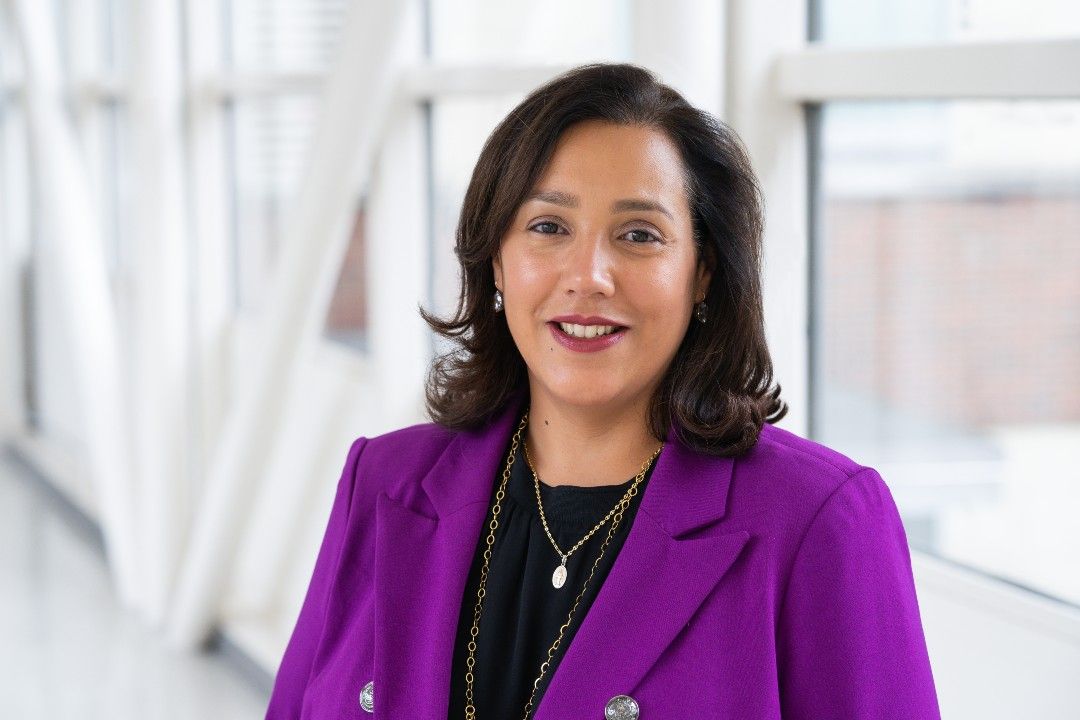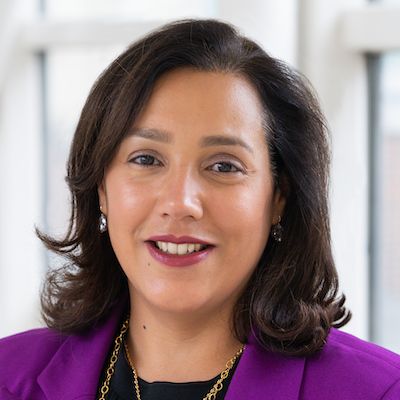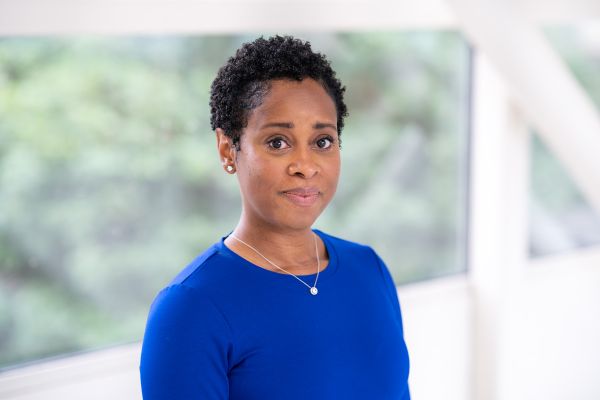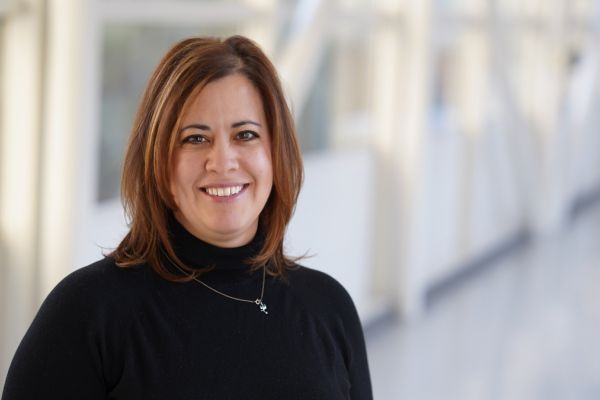A PBS documentary inspired social scientist’s career in cancer prevention
As a child, Elisa Marie Rodriguez’ love of watching PBS documentaries helped lead her to an academic path in public health.
“I didn’t have examples of researchers around me or even medical doctors for that matter as a child,” she recalls. “But I loved to read and to watch documentaries on PBS. 'Reading Rainbow' was one of my favorite shows. I somehow became engrossed in a special on Johns Hopkins, and I vividly recall telling my mother after the show that I was going to go to school there someday.”
Of course, she couldn’t know then that she would later be accepted to the doctoral program in Health Policy and Management in the Social Behavioral Sciences track at the Johns Hopkins Bloomberg School of Public Health.
Or that her career focus would shift due to “a culmination of life experiences and navigating uncharted paths” that led her to specialize in cancer prevention among underserved and underrepresented populations.
College award brought her to Roswell Park
In fact, winning an award as a junior at Canisius College in Buffalo brought Dr. Rodriguez to Roswell Park Comprehensive Cancer Center, a meeting that started her on the road to working in oncology. "I received a Howard Hughes fellowship award through a program to engage diverse students in science,” Dr. Rodriguez says. “I chose to meet with Dr. Sharon Evans at Roswell Park to discuss the possibility of interning in her immunology laboratory.”
At the time, Dr. Rodriguez was reading about the HIV/AIDS epidemic. “Coming across an opportunity to intern in an immunology lab was very exciting to me. I remember having a great meeting with Dr. Evans and immediately feeling comfortable with her. She was so enthusiastic about her research. I remember thinking how amazing it was to hear someone speak so passionately about their work.”
Dr. Rodriguez interned in Dr. Evans’ lab during her junior and senior years of college, learning what it means to be a bench scientist and to work in a laboratory setting. She also learned that Roswell Park offered graduate degrees, including a master’s program in natural sciences, and though she was considering medical school as a next step, she ended up enrolled at Roswell Park.
A family loss to cancer steered her career
Sadly, Dr. Rodriguez had another reason for heading in this career direction: a loss due to cancer in her family. “As a little girl, my great grandmother, who we called ‘Bita,’ passed away from bladder cancer. I knew nothing about her condition, just that it took the heart of our family away right before the Christmas holiday,” she says. “I was named after her and had a very close relationship with her. I knew she was ill because I saw her have less energy and lose her hair, but I didn’t understand why all of this was happening to her.
“Our family didn’t openly discuss her cancer and it wasn’t until I was much older that I knew what cancer she had. Elisa Claudio (Bita) was strong, compassionate, an amazing cook and was known for it at our church and in the community. She loved unconditionally and poured that into her family. I carry her name and memory with me every day and her death inspired me to want to understand what I did not understand about cancer as a child.”
The cancer epidemiology track that she followed in the Roswell Park graduate program steered Dr. Rodriguez to specialize in cancer prevention. Her decision to focus on underserved and underrepresented populations came about during her first year of doctoral studies at Johns Hopkins.
“I began to learn about community-based participatory research approaches and how to engage diverse community partners to address health disparities,” she says. “I was reading new articles and being exposed to areas of study beyond a cancer prevention focus that were complementary disciplines, including health policy and public health practice.”
These areas of study used different paradigms and ways of understanding health that went beyond a medical model focused on the individual and biological mechanisms.
Learning how social factors affect healthcare
“I was learning about frameworks that included social interactions and social environmental factors as essential in understanding health. I had found my academic home in the school of public health and it was one of the most pivotal times in my training.”
Today, Elisa Rodriguez, PhD, MS, certainly has found a home at Roswell Park, where she serves in several positions, including Director of Community Engagement Resource, in addition to Assistant Professor of Oncology in Cancer Prevention and Control. “At my core, I am a people person. I enjoy working with community partners to problem-solve and I have a knack for communicating scientific messages in meaningful ways across a variety of audiences. There was no doubt in my mind that working to address cancer health disparities would become the focus of my life’s work. It’s what I am meant to do.”
When asked if she has a favorite part of her job, she laughs and answers, “Which job? My favorite part of everything I do at Roswell Park is collaboration. I love working with people to help improve access to the tremendous resource we have in Western New York that is Roswell Park,” she says. “Being a researcher to me means I am always asking questions and looking for answers, which means I am constantly learning. My research allows me to be creative and work with other investigators, research advocates, community stakeholders and staff to find new ways of approaching issues and share ideas.”
Dr. Rodriguez says what sets her apart as a social behavioral scientist is that she also has multidisciplinary training in the natural sciences. “I do have a foundation in the biology and epidemiology of cancer which is different from many of my social science colleagues. I also have training in health policy and public health practice. I really wanted to have a better understanding of healthcare process and administration. When you really take the time to unpack cancer health disparities, it’s just as important to understand the healthcare access and patient experience as it is to understand the exposures and individual risks.”
A Buffalonian proud to work for her hometown
She adds that she is most proud of her education and the opportunity it provides her to contribute to this profession. “I am the first person in my family to earn a doctorate degree and I never take for granted how blessed I have been to continue my education. It wasn’t easy and I didn’t grow up seeing people who look like me on this career path. I took a chance on myself and never gave up. I chose to follow my passion and study what I enjoyed and that’s the best advice I offer to every student I encounter. Love what you do and do what you love, and the success will come.”
She also takes pride in working in her hometown of Buffalo and that her program of research is informed by and implemented in Western New York to address cancer health disparities our region experiences. Currently, she is preparing a clinical practice intervention program to increase HPV vaccinations among adolescents in rural community-based primary care settings. “HPV vaccination is an effective form of primary cancer prevention for several HPV-related cancers and vaccination rates remain low in non-metro and rural communities,” she notes. “This work involves colleagues at Roswell Park, Johns Hopkins and the State University of New York at Buffalo, and rural community healthcare stakeholders.”
Never miss another Cancer Talk blog!
Sign up to receive our monthly Cancer Talk e-newsletter.
She also works with Community Outreach and Education (COE) to enhance the ROCKstars (Research Oncology Community Knowledge stars) program that she co-developed with cancer survivors and COE staff to train cancer patients as research advocates and train investigators on how to include cancer survivors as part of their research team. “Cancer survivors love the opportunity to give feedback on the research, especially for a cancer that they experienced firsthand, and investigators continue to see the benefit of including the patient perspective early in the research and development process,” she says.
In her newest role, as Chief Diversity and Equity Officer for Faculty, she is working to enhance diversity and equity among Roswell Park faculty. “This work is important to our growth as a premier comprehensive cancer center but on a personal note, it’s important to me as a woman of color and as a mom to a vibrant and inquisitive six-year-old girl,” Dr. Rodriguez says. “She’s at that phase where kids talk about what they want to be when they grow up and she tells me that someday she’s going to be a ‘researcher doctor’ like me. I want her to be treated with kindness, fairness and respect, because as a mom, I know our children are like our hearts walking around outside of our bodies.
“I took on this role for several reasons, but at the top of my list was my desire to make a better way for my little girl and others like her. Future generations deserve better, we can do better and I will do my best to help start making those changes now.”



